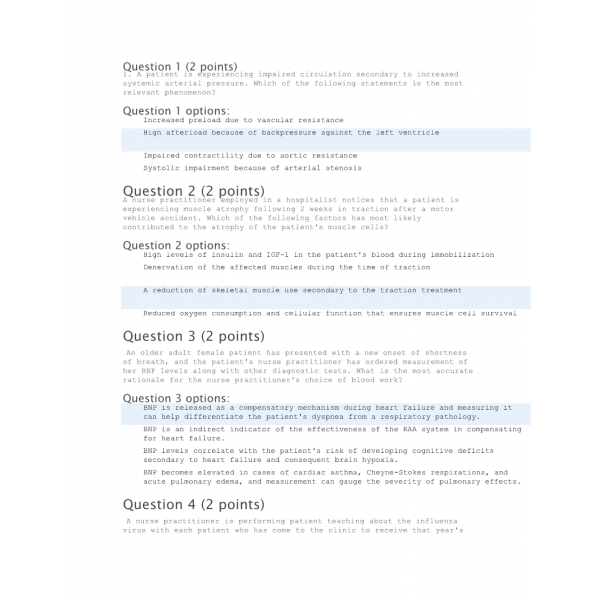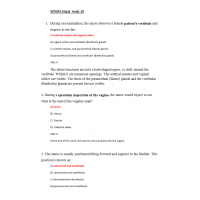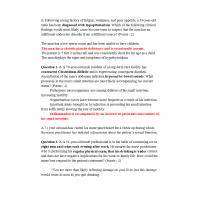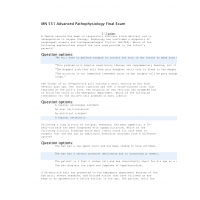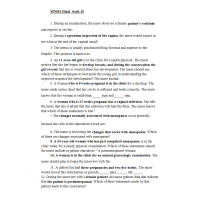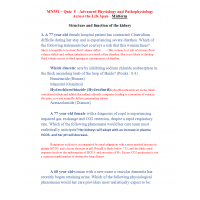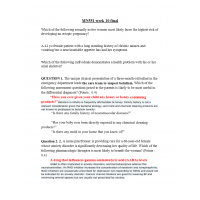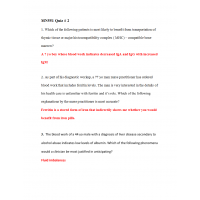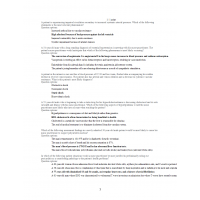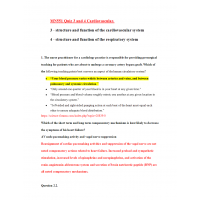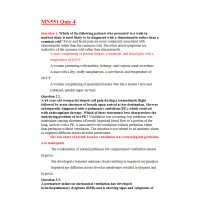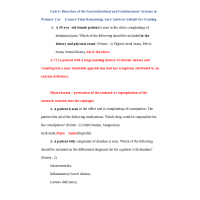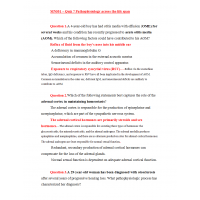MN 551 Midterm Exam 3
MN 551 Midterm Exam
1. A patient is experiencing impaired circulation secondary to increased systemic arterial pressure. Which of the following statements is the most relevant phenomenon?
2. A nurse practitioner employed in a hospitalist notices that a patient is experiencing muscle atrophy following 2 weeks in traction after a motor vehicle accident. Which of the following factors has most likely contributed to the atrophy of the patient's muscle cells?
3. An older adult female patient has presented with a new onset of shortness of breath, and the patient's nurse practitioner has ordered measurement of her BNP levels along with other diagnostic tests. What is the most accurate rationale for the nurse practitioner's choice of blood work?
4. A nurse practitioner is performing patient teaching about the influenza virus with each patient who has come to the clinic to receive that year's vaccine. Which of the following statements by patients best reflects an accurate understanding of the flu virus?
5. A 71-year-old woman is dependent on oxygen therapy and bronchodilators due to her diagnosis of emphysema. Which of the following processes would her care team be most justified in ruling out?
6. A 66-year-old patient's echocardiogram reveals a hypertrophied left ventricle, normal chamber volume, and a normal ejection fraction from the heart. What is this patient's most likely diagnosis?
7. Which of the following statements most accurately conveys an aspect of lymphatic system activity?
8. An 81-year-old male resident of a long-term care facility has a long-standing diagnosis of heart failure. Which of the following short-term and longer-term compensatory mechanisms is least likely to decrease the symptoms of his heart failure?
9. A nurse practitioner student is familiarizing herself with the overnight admissions to an acute medical unit of a university hospital. Which of the following patients would the student recognize as being least likely to have a diagnosis of antiphospholipid syndrome in his or her medical history?
10. The nurse practitioner is seeing a client who has an acute exacerbation of Crohn’s disease. The NP recognizes the fact that the disease involves the inflammation and irritation of the intestinal lining. Which of the following types of tissue is most likely involved in the patient's pathology?
11. A 22-year-old female with a history of intermittent flank pain, repeated UTIs, and hematuria has been diagnosed with autosomal dominant polycystic kidney disease (ADPKD). Which of the following phenomena has most likely contributed to the development of her health problem?
12. A community health nurse practitioner is teaching a group of female high school students about the importance of regular Papanicolaou (Pap) smears. The nurse recognizes that which of the following items underlies the rationale for this teaching?
13. A new older female patient at a long-term care facility has a diagnosis of type 1 neurofibromatosis (NF-1). As part of the intake assessment protocol for the facility, the clinical educator is teaching the care staff about the diagnosis. Which of the following statements most accurately conveys an aspect of neurofibromatosis?
14. A 21-year-old male patient has suffered a head injury during a crash on his motorcycle, and a deficit that assessments have revealed is an impaired swallowing mechanism. He has also developed aspiration pneumonia. Which of the following statements most accurately capture an aspect of his condition?
15. A male lifetime smoker has died as a result of chronic obstructive pulmonary disease. Which of the following phenomena regarding his alveoli would his care team have most reasonably expected in the weeks prior to his death?
16. A 62-year-old female smoker is distraught at her recent diagnosis of small cell lung cancer (SCLC). How can her nurse practitioner most appropriately respond to her?
17. Which of the following patients on a medical unit of a hospital is most likely to be experiencing health problems that may be attributable to kidney disease?
18. A 44-year-old woman developed calf pain during a transatlantic flight followed by acute shortness of breath upon arrival at her destination. She was subsequently diagnosed with a pulmonary embolism (PE), which resolved with anticoagulant therapy. Which of these statements best characterizes the underlying problem of her PE?
19. Which of the following patients would be considered to have a significant risk of developing the prerenal form of acute renal failure?
20. A group of researchers has identified that the prevalence of two particular genetic disorders share a statistical correlation. Which of the following statements best conveys the genetic rationale for this situation?
21. Which of the following individuals would be considered to be at risk for the development of edema?
22. A tourist presented to a primary care health clinic complaining of malaise, fever, and headache. She has subsequently been diagnosed with Rocky Mountain spotted fever, a pathology caused by Rickettsiaceae. Which of the followed statements best captures a characteristic trait of Rickettsiaceae?
23. A female patient is requiring supplementary oxygen by facemask due to her reduced lung compliance. Which of the following pathophysiologic processes is most likely to be a contributor to her low lung compliance?
24. A 60-year-old male patient with an acute viral infection is receiving interferon therapy. The nurse practitioner is teaching the family of the patient about the diverse actions of the treatment and the ways that it differs from other anti-infective therapies. Which of the following teaching points should the nurse practitioner exclude?
25. A 68-year-old male complains to his nurse practitioner that when he tests his blood pressure using a machine at his pharmacy, his heart rate is nearly always very low. At other times, he feels that his heart is racing, and it also seems to pause at times. The man has also occasionally had lightheadedness and a recent syncopal episode. What is this patient's most likely diagnosis and the phenomenon underlying it?
26. A nurse practitioner is explaining to a 40-year-old male patient the damage that Mycobacterium tuberculosis could do to lung tissue. Which of the following phenomena would underlie the nurse practitioner's explanation?
27. A child has been diagnosed with thalassemia. Which of the following other health problems is the child at risk for?
28. A patient has been admitted to an inpatient medical unit of a hospital with an acute viral infection. The health care team providing care for the patient would recognize which of the following statements as an accurate description of the role of viruses in human infections?
29. A 6-year-old girl with a diagnosis of Marfan syndrome is being assessed at a community health clinic. Which of the following assessments would be the health care professional's lowest priority?
30. A 7-year-old boy is admitted to the hospital with a suspected diagnosis of lead toxicity. Which of the following assessment findings is most congruent with the patient's diagnosis?
31. A 45-year-old patient who experienced exposure to radiation during an industrial accident several years prior is being assessed. Which of the following phenomena may underlie the genetic changes that have been noted in the patient?
32. A 77-year-old lifetime smoker has been diagnosed with a tumor in his lung at the site of an old tubercle scarring site, located in a peripheral area of his bronchiolar tissue. What is this patient's most likely diagnosis?
33. Which of the following patients is most likely to benefit from transplantation of thymic tissue or major histocompatibility complex (MHC)-compatible bone marrow?
34. A 68-year-old woman with a new onset of vascular dementia has recently begun retaining urine. Which of the following physiological phenomena would her care providers most realistically expect to be currently occurring as a result of her urinary retention?
35. A physical assessment of a 28-year-old female patient indicates that her blood pressure in her legs is lower than that in her arms and that her brachial pulse is weaker in her left arm than in her right. In addition, her femoral pulses are weak bilaterally. Which of the following possibilities would her care provider be most likely to suspect?
36. An 81-year-old female has long-standing hypocalcemia secondary to kidney disease and will shortly be moving into an assisted living facility from her own apartment. Which of the following findings should staff at the facility be instructed to observe for?
37. As a result of dehydration, a patient's epithelial cells are producing insufficient amounts of mucus. Consequently, the patient's mucociliary blanket is compromised. Which of the following changes would a care provider most reasonably anticipate as a direct result of this change?
38. A formerly normotensive woman, pregnant for the first time, develops hypertension and headaches at 26 weeks' gestation. Her blood pressure is 154/110 mm Hg and she has proteinuria. What other labs should be ordered for her?
39. Which of the following patients are NOT displaying known risk factors for the development of pulmonary emboli?
40. A 34-year-old male patient has diagnoses of liver failure, ascites, and hepatic encephalopathy secondary to alcohol abuse. The patient's family is questioning the care team about why his abdomen is so large even though he is undernourished and emaciated. Which of the following statements most accurately underlies the explanation that a member of the care team would provide to the family?
41. A number of patients have presented to the emergency department in the last 24 hours with complaints that are preliminarily indicative of myocardial infarction. Which of the following patients is least likely to have an ST-segment myocardial infarction (STEMI)?
42. A male patient of a nurse practitioner has an autosomal dominant disorder. The patient and his partner are considering starting a family. Which of the patient's following statements indicates the patient has an adequate understanding of the genetic basis of this health problem?
43. A 16-year-old female has been brought to her primary care nurse practitioner by her mother due to the girl's persistent sore throat and malaise. Which of the following facts revealed in the girl's history and examination would lead the nurse practitioner to rule out infectious mononucleosis?
44. A nurse educator is orientating new nurses to a renal unit of a hospital. Which of the following teaching points should the nurse include as part of a review of normal glomerular function?
45. Which of the following phenomena would be least likely to result in activation of the complement system?
| Institution & Term/Date | |
| Term/Date | Kaplan University |
-
$25.00

